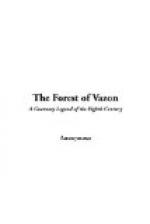A quick revulsion of feeling swept through the impressionable people. Her departure had been watched, the fall observed, and the serious nature of the accident was soon known; all hurried to the spot where she lay, full of sympathy and distress. Jean, perhaps not altogether unremorseful, was among the first to proffer aid; the stranger, left alone, took off the wreath and placed it on one of the stones of the circle, by which she stood contemplating the scene.
The blow, struck deep into the temple, was beyond any ordinary means of cure; life indeed seemed to be ebbing away. “Send for Marie!” the cry sprang from many mouths: “send for Marie the wise woman! she alone can save her!” Three or four youths ran hastily off.
“Wish ye for Marie Torode’s body or her spirit?” said a harsh female voice; “her body ye can have! but what avail closed eyes and rigid limbs? Her spirit, tossed by the whirling death-blast, is beyond your reach!”
The speaker, on whom all eyes turned, was an aged woman of unusual height; her snow-white hair was confined by a metal circlet, her eyes were keen and searching, her gestures imperious; her dress was simple and would have been rude but for the quaintly ornamented silver girdle that bound her waist, and the massive bracelets on her arms. Like the girl she was seen for the first time; her almost supernatural appearance inspired wonder and awe. She bent over the prostrate form: “Marie said with her last breath,” she muttered to herself, “that ere the oaks were green again the sweetest maidens in the island would be in her embrace, but she cannot summon this one now! her vext spirit has not yet the power!”
She examined the wound, and raising herself said, “No human hand can save her. The Spirits alone have power: those Spirits who prolong human life regardless of human ills; but they must be besought, and who will care to beseech them?”
“Prayers may save her,” answered a stern voice, “but not prayers to devils! The Holy Virgin should we beseech, by whom all pure maidens are beloved. She will save her if it be God’s will, or receive her into her bosom if it be decreed that she should die.”
The words were those of Father Austin, one of the monks of Lihou, distinguished by his sanctity and the austerity of his habits. He was spare, as one who lived hardly; his grey eyes had a dreamy look betokening much inward contemplation, though they could be keen enough when, as now, the man was roused; there was a gentleness about his mouth which showed a nature filled with love and sympathy.




